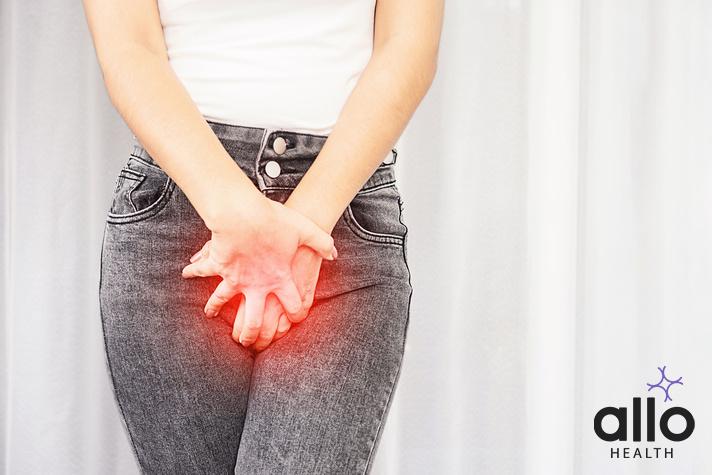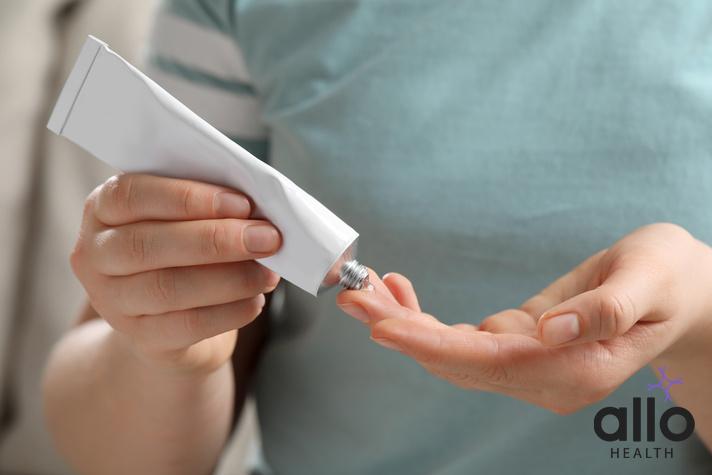4 Ways to Manage Bleeding After Anal Sex

Allo Health is dedicated to personalized well-being, offering support and trusted information tailored to individual health goals. The platform emphasizes human-generated content, led by a distinguished medical team of experts, including physicians and sexual health specialists. Their commitment to credibility involves rigorous fact-checking, authoritative research, and continuous updates to ensure accurate, up-to-date information. Allo Health's unique approach goes beyond conventional platforms, providing expert-led insights and a continuous commitment to excellence, with user feedback playing a crucial role in shaping the platform's authoritative voice.

Dr. Aswathi P T earned her MBBS degree and completed her internship at Government Medical College, Kozhikode, and possess diverse professional background spanning 3.5 years. Her experience includes a wide range of healthcare settings, including health centers, hospitals, and teleconsultation services.
Why This Was Upated?
Our experts continually monitor the health and wellness space, and we update our articles when new information became available.
Updated on 01 June, 2024
- Article was updated as part of our commitment to diversity, equity, and inclusion.

"The following blog article provides general information and insights on various topics. However, it is important to note that the information presented is not intended as professional advice in any specific field or area. The content of this blog is for general educational and informational purposes only.
Book consultation
The content should not be interpreted as endorsement, recommendation, or guarantee of any product, service, or information mentioned. Readers are solely responsible for the decisions and actions they take based on the information provided in this blog. It is essential to exercise individual judgment, critical thinking, and personal responsibility when applying or implementing any information or suggestions discussed in the blog."
Anal sex can be a deeply fulfilling experience for many. However, it’s not uncommon for individuals to encounter a bit of bleeding after anal sex. This article aims to provide a clear understanding of the common reasons for this occurrence, preventive measures, and when it’s crucial to seek medical attention.
What is Anal Sex?
Anal sex is a form of sexual activity involving the insertion of the penis, fingers, sex toys, or other objects into the anus. It can be a source of pleasure due to the high concentration of nerve endings in the anal region. However, it’s important to understand the anatomy and potential risks involved.
Key Aspects of Anal Sex
- Anal Penetration: The act of inserting into the anus. This area has delicate tissue and a high density of nerve endings, which can contribute to anal pleasure.
- Anal Intercourse: Specifically refers to the penetration of the anus by a penis.
- Use of Sex Toys: Butt plugs, anal dilators, and other toys are often used to enhance the experience or prepare for anal penetration.
Common Reasons for Bleeding After Anal Sex
Common reasons for bleeding after anal sex include:
- Anal Fissures and Tears: Small cuts or lacerations in the delicate anal tissue, often due to dry or forceful anal penetration. These fissures can occur when the anal sphincter is stretched beyond its capacity, especially without adequate lubrication.
- Swollen Blood Vessels: The intense pressure and friction during anal intercourse can lead to swollen or burst blood vessels. This is more common in individuals with conditions like hemorrhoids (piles of blood vessels) or dilated veins in the anal area.
- Due to Pre-existing Conditions: Conditions like anal warts or hemorrhoids can be aggravated by the physical stress of anal intercourse, leading to bleeding. These conditions create weakened areas in the tissue that are more susceptible to bleeding during sex.
- Due to Infections: Infections such as a urinary tract infection can cause increased sensitivity and inflammation in the anal region, leading to a higher risk of bleeding during anal activities.
- Inadequate Lubrication: Using the wrong type of lube, such as oil-based lube with latex condoms, can increase friction and cause tears. Water-based lube is generally recommended to minimize friction and reduce the risk of tearing.
- Due to Forceful or Deep Penetration: Aggressive sexual activity, including the use of large butt plugs or deep penetration, can cause trauma to the delicate anal tissue, leading to bleeding.
- Injury from Anal Toys: Improper use of anal toys like butt plugs or anal dilators can cause injury to the anal canal, leading to bleeding.
Recognizing these common causes is crucial for preventing and managing bleeding after anal sex, ensuring a safe and enjoyable experience.
Prevention and Care During and After Anal Sex

1. Lubrication is Essential
- Choosing the Right Lube: Use water-based lube as it is gentler on the delicate anal tissue and compatible with latex condoms. Avoid oil-based or silicone lubes as they can increase the risk of tearing.
- Generous Application: Apply a sufficient amount of lube to reduce friction, which helps protect the delicate external tissue of the anal area.
2. Gentle Penetration
- Avoiding Aggressive Techniques: Steer clear of aggressive sexual positions like doggy style that might cause deeper penetration and lead to anal tears.
- Understanding of Limits: Pay attention to the body’s signals. If there’s extreme pain or discomfort, stop and reassess.
3. Post-Sex Care
- Warm Water Baths: Taking a warm bath can help soothe the area after anal intercourse.
- Rest and Healing: Avoid further sexual activity for a couple of days if there’s mild bleeding or discomfort to allow the tissues to heal.
- Cold Compresses: If there’s mild anal swelling or a bit of blood, applying cold compresses can be beneficial.
4. Monitoring for Complications
- Watch for Persistent Symptoms: Continuous bleeding, severe pain, or signs of infection (like unusual discharge or extreme anal swelling) should be monitored closely.
- Seeking Medical Attention: If symptoms like severe pain, persistent bleeding, or swollen blood vessels continue, it’s important to consult a healthcare provider for advice and potential treatment.
Choosing the Right Tools for Anal Sex
Engaging in anal sex can be a source of pleasure for many, but it’s crucial to choose the right tools to ensure a safe and enjoyable experience.
Lubrication is Essential for Comfort
- Water-Based Lube: Ideal for most situations; it’s gentle on the delicate anal tissue and safe with latex condoms.
- Oil-Based Lube: Can provide longer-lasting lubrication but might not be suitable with latex condoms and can increase the risk of tearing.
- Silicone Lubes: Great for longer sessions, but be cautious as they can degrade silicone toys.
Use Condoms For Safety and Hygiene
- Latex Condoms: They offer a barrier against infection and reduce the risk of transmitting STIs.
- Non-Latex Options: For those with latex allergies, alternatives like polyurethane condoms are available.
Anal Toys to Enhance Pleasure Safely
- Butt Plugs: Choose plugs with a flared base to prevent them from getting lost in the rectal passage.
- Anal Dilators: Gradually increase the size to avoid causing tears or extreme pain in the sensitive anal area.
Other Considerations
- Anal Sphincter Care: The anal sphincter is full of nerve endings and can be a source of pleasure. However, it’s delicate, so gentle stretching and gradual dilation are key.
- Warm Water Baths: Post-activity, a warm bath can help in soothing any mild anal swelling or discomfort.
- Cold Compresses: For immediate relief from mild anal discomfort or swelling, cold compresses can be effective.
Safety During Certain Positions and Techniques
- Gentle Penetration: Avoid forceful or deep penetration, especially in positions like doggy style, to prevent anal tears or fissures.
- Go Slow and Steady: Start slowly and gradually increase the intensity to ensure the comfort and safety of all parties involved.
When to Seek Medical Attention

Consulting a doctor due to bleeding after anal sex is crucial under certain circumstances. Here are key indicators that medical attention is needed:
- Persistent Bleeding: If the bleeding continues for more than a couple of days, it’s important to seek medical advice. Occasional mild bleeding might not be a severe concern, but ongoing rectal bleeding warrants a check-up.
- Severe Pain or Discomfort: Experiencing severe pain, especially if accompanied by bleeding, could indicate anal fissures, swollen blood vessels, or other significant concerns.
- Symptoms of Infection: Look out for signs like unusual discharge, severe anal swelling, or extreme pain. These could indicate an infection such as a urinary tract infection or an concern with anal warts.
- Aggravated Pre-existing Conditions: If you have known conditions like hemorrhoids (piles of blood vessels) or anal warts, and notice increased discomfort or bleeding after anal sex, it’s wise to consult a doctor.
- Ineffectiveness of Home Remedies: If simple measures like warm water baths, applying cold compresses, and taking a break from sexual activity don’t alleviate the symptoms, it’s time to get professional help.
- Change in Bowel Habits: If you notice changes in your bowel movements or the nature of the bleeding (such as a lot of blood flow), a doctor’s opinion is necessary.
Maintaining cleanliness is crucial. Before and after anal intercourse, thoroughly clean the area. This reduces the risk of infection and promotes speedier healing.
Conclusion
Bleeding after anal sex can happen for a variety of reasons, from anal fissures to swollen blood vessels. While a bit of butt bleeding can be a mild concern, it’s crucial to be cautious. Using appropriate lubrication, being gentle during penetration, and maintaining good hygiene can ensure a safe and enjoyable experience. Remember, persistent or severe symptoms warrant medical attention to rule out serious conditions.
Frequently Asked Questions (FAQ)
(1) Why does bleeding occur after anal sex?
Bleeding after anal sex can happen for several reasons. The most common are small cuts or tears in the delicate skin (anal fissures), swollen blood vessels, or aggravation of pre-existing conditions like hemorrhoids or anal warts. These concerns can arise from insufficient lubrication, too much force, or deep penetration.
(2) What kind of lubricant should I use to prevent bleeding?
To prevent bleeding, opt for a water-based lubricant. These lubes are gentle on the sensitive anal tissue and are safe to use with latex condoms. Avoid oil-based or silicone lubes, as they might increase the risk of tearing the delicate skin in the anal area.
(3) Is it normal to experience a bit of blood after anal sex?
A bit of blood after anal sex can be normal, especially if it’s your first time or if there wasn’t enough lubrication. However, if the bleeding is heavy, doesn’t stop after a couple of days, or is accompanied by severe pain, it’s important to seek medical attention.
(4) How can I care for myself if I experience bleeding after anal sex?
If you experience bleeding, take a warm bath to soothe the area and avoid any sexual activity for a few days to allow healing. Applying a cold compress can help with mild bleeding. If the bleeding persists or you experience severe pain, consult a healthcare professional.
(5) Can bleeding after anal sex be a sign of something serious?
While mild bleeding can be a common and minor concern, persistent or heavy bleeding, extreme pain, or signs of infection like unusual discharge or severe swelling could indicate a more serious condition. In such cases, it’s crucial to get medical attention promptly.



































